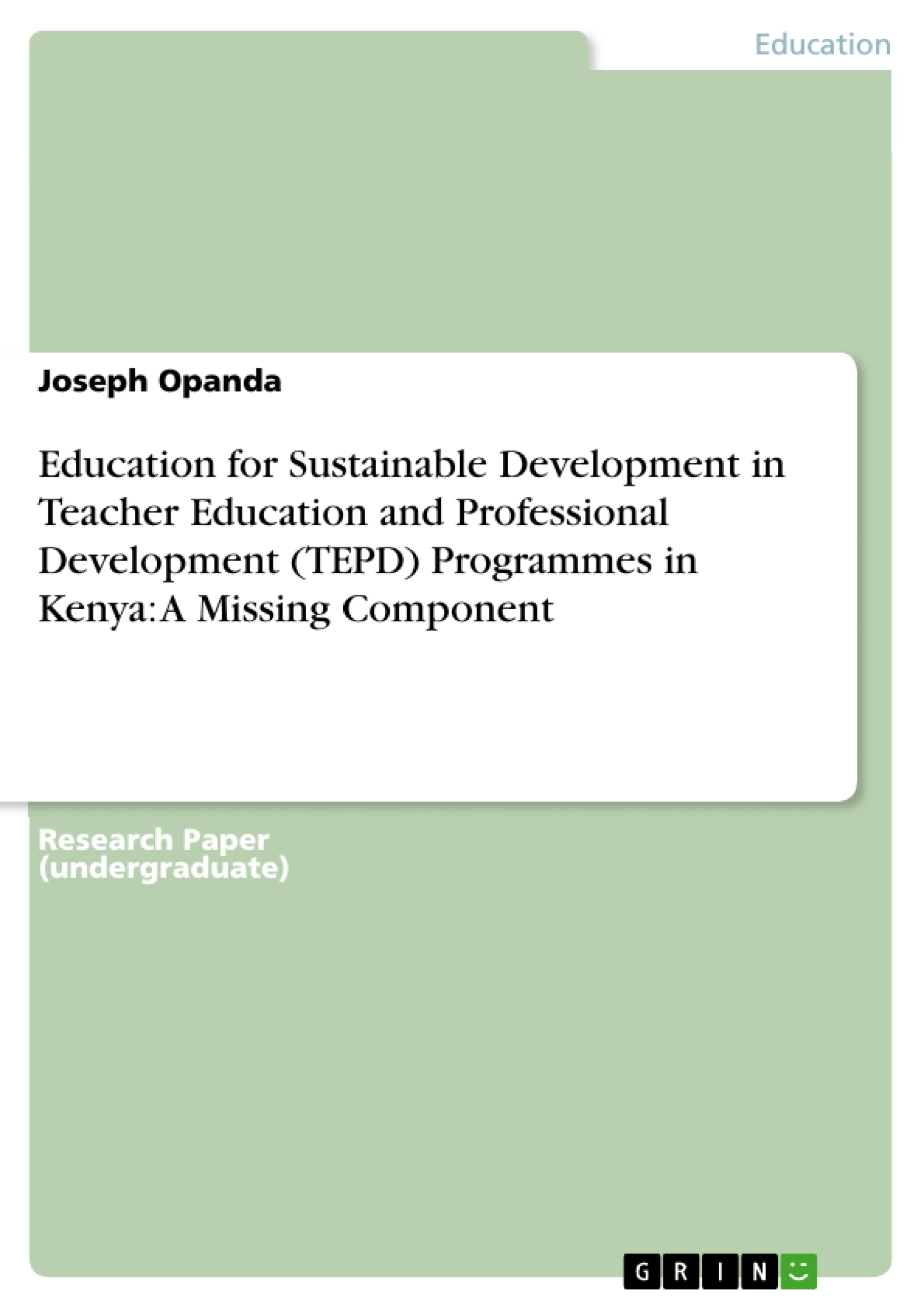This article discusses the role of the teacher educators in reorienting teacher education to address sustainability. The article analyzes the implementation of aims and tasks of the UN Decade of Education for Sustainable Development (DESD) (2005-2014) among Teacher trainers/educators in Kenya. The three recent teacher education and professional development (TEPD) programmes conducted in public Teacher Training Colleges (T.T.Cs) in Kenya were scrutinized with a view of establishing the extend to which Education for Sustainable Development (ESD) has been incorporated in teacher education programmes. Both the analysis and the literature review provide no evidence that ESD has become an integral part of most teacher education programmes, and that there is no teacher education initiative that has strategically set out to mainstream sustainability into the core of teacher education programmes particularly in light of current and developing trends in education in Kenya. There is therefore, almost a blank spot in both the body of knowledge on teacher education and the actual practices of many teacher educators with regard to ESD. The article concludes with a discussion of ways to remedy the situation.
Inhaltsverzeichnis (Table of Contents)
- Abstract
- Introduction
- Decade of Education for Sustainable Development
- Teacher Education in Kenya
Zielsetzung und Themenschwerpunkte (Objectives and Key Themes)
This article examines the role of teacher educators in incorporating sustainability into teacher education programs in Kenya. The author analyzes the implementation of the UN Decade of Education for Sustainable Development (DESD) among teacher trainers in the country. The article investigates the extent to which Education for Sustainable Development (ESD) has been integrated into recent teacher education and professional development (TEPD) programs.
- The significance of teacher educators in promoting sustainability in education.
- The implementation of the UN DESD in teacher education programs in Kenya.
- The lack of ESD integration in most teacher education programs in Kenya.
- The importance of reorienting teacher education to address sustainability.
- The need for teacher education initiatives that strategically mainstream sustainability into teacher education.
Zusammenfassung der Kapitel (Chapter Summaries)
- Abstract: This article argues that Education for Sustainable Development (ESD) is a missing component in most teacher education programs in Kenya. The author analyzes the implementation of the UN Decade of Education for Sustainable Development (DESD) and finds that ESD has not been adequately integrated into the curriculum.
- Introduction: The article introduces the concepts of sustainability and sustainable development, highlighting their importance in addressing global challenges. It emphasizes the role of education in promoting sustainability and the need for teacher educators to be involved in this process.
- Decade of Education for Sustainable Development: This section discusses the objectives of the UN Decade of Education for Sustainable Development (DESD), which aimed to integrate sustainable development principles into all areas of learning. The author notes that the DESD was intended to promote public awareness and wider participation in ESD initiatives.
- Teacher Education in Kenya: The author explores the importance of teacher education in shaping the knowledge and skills of future generations. The article highlights the need for teacher education institutions to be involved in national sustainability plans and the potential of these institutions to promote ESD.
Schlüsselwörter (Keywords)
Key terms and concepts explored in the article include teacher education, sustainable development, Education for Sustainable Development (ESD), UN Decade of Education for Sustainable Development (DESD), teacher trainers, curriculum development, and Kenya's education system.
Frequently Asked Questions
What is the status of ESD in Kenya's teacher training colleges?
Research shows that Education for Sustainable Development (ESD) is currently a "missing component" and not yet an integral part of most teacher education programs in Kenya.
What was the goal of the UN Decade of ESD (DESD)?
The goal (2005-2014) was to integrate the principles of sustainable development into all aspects of education and learning worldwide.
Why are teacher educators crucial for sustainability?
Teacher educators shape the knowledge and skills of future teachers, making them essential for mainstreaming sustainability into the core of the national education system.
What challenges prevent the integration of ESD in Kenya?
The article identifies a lack of strategic initiatives to mainstream sustainability and a gap in the body of knowledge among teacher trainers regarding ESD practices.
How can the situation in teacher education be improved?
The article concludes with a discussion on reorienting teacher education programs to strategically include sustainability principles in their curriculum.
- Arbeit zitieren
- Joseph Opanda (Autor:in), 2013, Education for Sustainable Development in Teacher Education and Professional Development (TEPD) Programmes in Kenya: A Missing Component, München, GRIN Verlag, https://www.grin.com/document/208668



